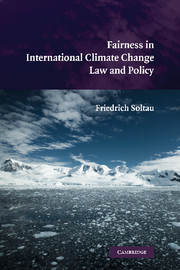Book contents
- Frontmatter
- Contents
- List of Abbreviations and Acronyms
- Acknowledgments
- 1 Fairness in International Climate Law and Policy
- 2 The Science of Climate Change and the Energy Challenge
- 3 Development of the International Climate Change Regime
- 4 Theoretical Aspects of Fairness
- 5 Fairness in the Climate Change Regime
- 6 Evaluation of Proposals for Future Climate Policy
- 7 Conclusion
- Bibliography
- Index
- References
2 - The Science of Climate Change and the Energy Challenge
Published online by Cambridge University Press: 24 December 2009
- Frontmatter
- Contents
- List of Abbreviations and Acronyms
- Acknowledgments
- 1 Fairness in International Climate Law and Policy
- 2 The Science of Climate Change and the Energy Challenge
- 3 Development of the International Climate Change Regime
- 4 Theoretical Aspects of Fairness
- 5 Fairness in the Climate Change Regime
- 6 Evaluation of Proposals for Future Climate Policy
- 7 Conclusion
- Bibliography
- Index
- References
Summary
THE SCIENCE OF CLIMATE CHANGE
This chapter provides an overview of the science of climate change, drawing largely on the reports of the Intergovernmental Panel on Climate Change (IPCC), an international, multidisciplinary assessment body established by the United Nations (UN). The material covered is intended to frame and inform the analysis in subsequent chapters. The information is based on the consensus contained in the reports of the IPCC, especially the Fourth Assessment Report (4AR), released in 2007. Science is coming to the fore in new ways and is influencing institutions, including those setting norms at the international level. Science influences how the problem is framed. At the same time, political processes bear on the way in which scientific output is received and used in policy making. The central role of energy in modern life – and its dominance as a source of greenhouse gas (GHG) emissions – means that this is where the battle against climate change must be joined. This chapter thus includes a brief summary of the main features of the energy challenge.
EMISSION TRENDS
The primary contributor to global climate change is carbon dioxide (CO2), which is released by the burning of fossil fuels as well as by land-use change, particularly deforestation. Carbon dioxide emissions from fossil fuel use rose to 26.4 billion metric tons per year in 2000–2005, with the contribution of carbon dioxide emissions from land-use change (mainly deforestation) being estimated at 5.9 billion metric tons per year during the 1990s.
- Type
- Chapter
- Information
- Fairness in International Climate Change Law and Policy , pp. 21 - 49Publisher: Cambridge University PressPrint publication year: 2009
References
- 1
- Cited by



